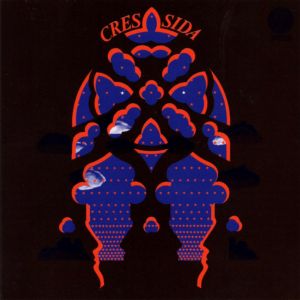
- Format: MP3

Japanese 24 Bit Remaster
CRESSIDA biography:
CRESSIDA were an excellent band of early British symphonic progressive scene. Their sound is mostly dominated by the most beautiful and symphonic Hammond organ (dirty, and mellow), piano, bass, guitar, and drums. The instrumental sections are equally good, and tend to be typical of early 70s English prog rock. Thanks to the captivating atmospheres and the technical ability of the musicians. Similar bands include FANTASY, BEGGARS' OPERA, CIRKUS, GRACIOUS, and SPRING.
Both CRESSIDA albums are excellent and very rare now (both were original Vertigo "Swirls"). Their self-titled debut is an early seventies forgotton classic with delicate vocals, gobs of organ and acoustic guitar. CRESSIDA's second "Asylum" is the best of the genre represented by BEGGARS' OPERA, SPRING, FANTASY, FRUUPP, and many more. The combinations of instruments used for this album featuring the flute and different keyboard configurations accompanied by acoustic guitar works. This album, though, was by far the be...
CRESSIDA were an excellent band of early British symphonic progressive scene. Their sound is mostly dominated by the most beautiful and symphonic Hammond organ (dirty, and mellow), piano, bass, guitar, and drums. The instrumental sections are equally good, and tend to be typical of early 70s English prog rock. Thanks to the captivating atmospheres and the technical ability of the musicians. Similar bands include FANTASY, BEGGARS' OPERA, CIRKUS, GRACIOUS, and SPRING.
Gibraltar Progressive Rock:
This is a bit of an obscurity, but undeservedly so! Cressida were a progressive rock group from the early seventies, with a sound based around organ/piano/ Mellotron, similar to Beggars' Opera, and such groups. Asylum is the better of their two releases, and is sure to appeal to those who like the sound of that era. The compositions are very melodic, minor-chord based works, and, at times recall the early works of Fruupp and The Nice.
Cressida was one of several bands from the late '60s and very early '70s that were inspired by the Moody Blues. Similar bands include Fantasy, Salamander, Beggar's Opera, Cirkus, and Spring. The focus in on organ and guitar, often with a Mellotron backdrop. Flute is sprinkled throughout. Recommended for fans of any of the above groups but symphonic, fusion, or heavy-prog fans may want to audition first. Personally, I think it's good for what it is but I get enough of this style from the Moody Blues. Asylum is more developed than Cressida, adds some strings and horns as occasional sonic highlights, and is is generally more mature. Thus, if you're interested, Asylum is the recommended starter.
A worthwhile find from the early British scene. Asylum is the second Cressida album, released on thel legendary "swirl" Vertigo label around the same time as Gentle Giant's Acquiring The Taste and the first Jade Warrior album. Cressida vocalist Angus Cullen sings in a pleasing British folkie style, while keyboardist Peter Jennings organ and piano playing has an apparent jazzy slant. John Culley's electric guitar playing seems to be hanging on to the remnants of the sixties, but it doesn't date the music too awful much. The band's sound benefits a good deal from the orchestrations on several tracks, which make them sound much more progressive than they otherwise might have, especially on the climactic "Munich," my favourite song on this album. "Lisa" and the eleven-minute "Let Them Come When They Will" are other touchstone tracks, the rest of the album is adequate; not exceptional but harmless. "Goodbye Post Office Tower Goodbye" shows the band's sense of humour, and is probably a disgruntled postal-workers anthem.